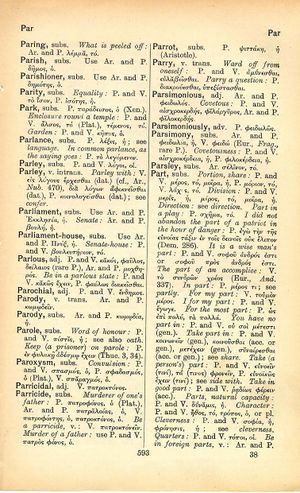part: Difference between revisions
Θέλομεν καλῶς ζῆν πάντες, ἀλλ' οὐ δυνάμεθα → Bene vivere omnes volumus, at non possumus → Gut leben wollen wir alle, doch wir können es nicht
(Woodhouse 4) |
(CSV4) |
||
| Line 1: | Line 1: | ||
{{ | {{Woodhouse1 | ||
| | |Text=[[File:woodhouse_593.jpg|thumb|link={{filepath:woodhouse_593.jpg}}]]'''subs.''' | ||
<b class="b2">Portion, share</b>: P. and V. [[μέρος]], τό, [[μοῖρα]], ἡ, P. [[μόριον]], τό, V. [[λάχος]], τό. | |||
<b class="b2">Division</b>: P. and V. [[μερίς]], ἡ, [[μέρος]], τό, [[μοῖρα]], ἡ. | |||
<b class="b2">Direction</b>: see [[direction]]. | |||
<b class="b2">Part in a play</b>: P. [[σχῆμα]], τό. | |||
<b class="b2">I did not abandon the part of a patriot in the hour of danger</b>: P. ἐγὼ τὴν τῆς εὐνοίας τάξιν ἐν τοῖς δεινοῖς οὐκ ἔλιπον (Dem. 286). | |||
<b class="b2">It is a wise man's part</b>: P. and V. σοφοῦ ἀνδρός ἐστι or σοφοῦ πρὸς ἀνδρός ἐστι. | |||
<b class="b2">The part of an accomplice</b>: V. τὸ συνδρῶν [[χρέος]] (Eur., ''And.'' 337). | |||
<b class="b2">In part</b>: P. [[μέρος]] τι; see [[partly]]. | |||
<b class="b2">For my part</b>: V. τοὐμὸν [[μέρος]]. | |||
<b class="b2">I for my part</b>: P. and V. ἔγωγε. | |||
<b class="b2">For the most part</b>: P. ὡς ἐπὶ πολύ, τὰ πολλά. | |||
<b class="b2">You have no part in</b>: P. and V. οὐ σοὶ μέτεστι (gen.). | |||
<b class="b2">Take part in</b>: P. and V. κοινωνεῖν (gen.), κοινοῦσθαι (acc. or gen.), μετέχειν (gen.), συναίρεσθαι (acc. or gen.); see [[share]]. | |||
<b class="b2">Take</b> (<b class="b2">a person's</b>) <b class="b2">part</b>: P. and V. εὐνοεῖν (τινί), τά (τινος) φρονεῖν, P. εὐνοϊκῶς ἔχειν (τινί); see [[side with]]. | |||
<b class="b2">Take in good part</b>: P. and V. ῥᾳδίως [[φέρω|φέρειν]] (acc.). | |||
<b class="b2">Parts, natural capacity</b>: P. and V. [[δύναμις]], ἡ. | |||
<b class="b2">Character</b>: P. and V. [[ἦθος]], τό, [[τρόπος]], ὁ, or pl. | |||
<b class="b2">Cleverness</b>: P. and V. [[σοφία]], ἡ. [[φρόνησις]], ἡ; see [[cleverness]]. | |||
<b class="b2">Quarters</b>: P. and V. τόποι, οἱ. | |||
<b class="b2">Be in foreign parts</b>, v.: Ar. and P. ἀποδημεῖν. | |||
<b class="b2">From all parts</b>: see <b class="b2">from every direction</b>, under [[direction]]. | |||
'''v. trans.''' | |||
<b class="b2">Separate</b>: P. and V. χωρίζειν, σχίζειν, διείργειν, διαλαμβάνειν, διαιρεῖν, διιστάναι (Eur., <b class="b2">Frag.</b>), Ar. and P. διαχωρίζειν, διασπᾶν, V. νοσφίσαι (1st aor. act. of νοσφίζεσθαι), P. διασχίζειν. | |||
<b class="b2">Cut off</b>: P. ἀπολαμβάνειν, διαλαμβάνειν. | |||
<b class="b2">Separate locally</b> (<b class="b2">as a dividing line</b>): P. and V. σχίζειν. | |||
<b class="b2">About the river Tanaus that parts the borders of the Argive land and the soil of Sparta</b>: V. ἀμφὶ ποταμὸν Ταναὸν Ἀργείας ὅρους τέμνοντα γαίας Σπαρτιάτιδός τε γῆς (Eur., ''El.'' 410). | |||
V. intrans. <b class="b2">Fork</b> (<b class="b2">of a road</b>): P. and V. σχίζεσθαι. | |||
<b class="b2">Break</b>: P. and V. ῥήγνυσθαι; see [[break]]. | |||
<b class="b2">Of themselves the fetters parted from their feet</b>: V. αὐτόματα δʼ αὐταῖς δεσμὰ διελύθη ποδῶν (Eur., <b class="b2">Bacch.</b> 447). | |||
<b class="b2">Be separated, go different ways</b>: P. and V. χωρίζεσθαι, ἀφίστασθαι, διίστασθαι. Ar. and P. διακρίνεσθαι. | |||
<b class="b2">When we parted</b>: P. ἐπειδὴ ἀπηλλάγημεν (Dem. 1169). | |||
<b class="b2">Part from</b>: P. and V. ἀφίστασθαι (gen.), V. ἀποζεύγνυσθαι (gen.) (Eur., ''H.F.'' 1375). | |||
<b class="b2">Part with</b>: P. and V. ἀπαλλάσσεσθαι (gen.), ἀφίστασθαι (gen.), ἀπολείπεσθαι (gen.). | |||
<b class="b2">Be deprived of</b>: see under [[deprive]]. | |||
<b class="b2">Give</b>: see [[give]]. | |||
}} | }} | ||
Revision as of 09:48, 21 July 2017
English > Greek (Woodhouse)
subs.
Portion, share: P. and V. μέρος, τό, μοῖρα, ἡ, P. μόριον, τό, V. λάχος, τό. Division: P. and V. μερίς, ἡ, μέρος, τό, μοῖρα, ἡ. Direction: see direction. Part in a play: P. σχῆμα, τό. I did not abandon the part of a patriot in the hour of danger: P. ἐγὼ τὴν τῆς εὐνοίας τάξιν ἐν τοῖς δεινοῖς οὐκ ἔλιπον (Dem. 286). It is a wise man's part: P. and V. σοφοῦ ἀνδρός ἐστι or σοφοῦ πρὸς ἀνδρός ἐστι. The part of an accomplice: V. τὸ συνδρῶν χρέος (Eur., And. 337). In part: P. μέρος τι; see partly. For my part: V. τοὐμὸν μέρος. I for my part: P. and V. ἔγωγε. For the most part: P. ὡς ἐπὶ πολύ, τὰ πολλά. You have no part in: P. and V. οὐ σοὶ μέτεστι (gen.). Take part in: P. and V. κοινωνεῖν (gen.), κοινοῦσθαι (acc. or gen.), μετέχειν (gen.), συναίρεσθαι (acc. or gen.); see share. Take (a person's) part: P. and V. εὐνοεῖν (τινί), τά (τινος) φρονεῖν, P. εὐνοϊκῶς ἔχειν (τινί); see side with. Take in good part: P. and V. ῥᾳδίως φέρειν (acc.). Parts, natural capacity: P. and V. δύναμις, ἡ. Character: P. and V. ἦθος, τό, τρόπος, ὁ, or pl. Cleverness: P. and V. σοφία, ἡ. φρόνησις, ἡ; see cleverness. Quarters: P. and V. τόποι, οἱ. Be in foreign parts, v.: Ar. and P. ἀποδημεῖν. From all parts: see from every direction, under direction. v. trans. Separate: P. and V. χωρίζειν, σχίζειν, διείργειν, διαλαμβάνειν, διαιρεῖν, διιστάναι (Eur., Frag.), Ar. and P. διαχωρίζειν, διασπᾶν, V. νοσφίσαι (1st aor. act. of νοσφίζεσθαι), P. διασχίζειν. Cut off: P. ἀπολαμβάνειν, διαλαμβάνειν. Separate locally (as a dividing line): P. and V. σχίζειν. About the river Tanaus that parts the borders of the Argive land and the soil of Sparta: V. ἀμφὶ ποταμὸν Ταναὸν Ἀργείας ὅρους τέμνοντα γαίας Σπαρτιάτιδός τε γῆς (Eur., El. 410). V. intrans. Fork (of a road): P. and V. σχίζεσθαι. Break: P. and V. ῥήγνυσθαι; see break. Of themselves the fetters parted from their feet: V. αὐτόματα δʼ αὐταῖς δεσμὰ διελύθη ποδῶν (Eur., Bacch. 447). Be separated, go different ways: P. and V. χωρίζεσθαι, ἀφίστασθαι, διίστασθαι. Ar. and P. διακρίνεσθαι. When we parted: P. ἐπειδὴ ἀπηλλάγημεν (Dem. 1169). Part from: P. and V. ἀφίστασθαι (gen.), V. ἀποζεύγνυσθαι (gen.) (Eur., H.F. 1375). Part with: P. and V. ἀπαλλάσσεσθαι (gen.), ἀφίστασθαι (gen.), ἀπολείπεσθαι (gen.). Be deprived of: see under deprive. Give: see give.

